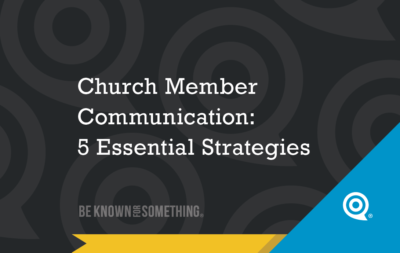Want to Love? Start with a Persona.

We’re called to love. In fact, Jesus told His disciples that we’d be known for love if we’re properly following Him. So, who are we called to love? Everyone (especially our enemies). It’s a crazy goal.
Can a local church love everyone? Yes. But maybe it’s more reasonable to say that we should love anyone we come (or could come) into contact with. That way we can get really practical with our love.
In church communication, our words, actions, ministries must be felt as love. That’s why effective communication rises and falls on how well we know our audience:
- The more you know about a group, the more you can do something that will be received as love.
- The smaller the defined group, the easier it is to know them and deliver something that they’ll receive as love.
For years in communication (marketing), we’ve understood that a small targeted group is much easier to provide with a service or product. That group’s called a persona. An organization can target a primary persona or fragment into several groups that are assigned a priority (primary, secondary, tertiary). The more groups? The more expensive and difficult it is to reach them effectively.
Your church needs to define personas so that you have a full understanding of their needs, concerns, and goals in order to provide them (out of love) with solutions and/or paths to goals.
Instead, the church has found that our overriding perception is what we’re against, what we’re trying to change in people, and ultimately a negative vibe. It’s a long way from love. No wonder why the community isn’t attracted to our message! Instead, let’s decide on some groups in our community, define them, pursue them, and love them. Use that momentum to move to other groups and let your whole community know you love them too.
Here’s a 3-step process to define your persona group(s):
- Define your external community. That should be the area where you’re actually reaching people. Plot on a map your family units and create a custom polygon area that’s your reach area (ignore outliers).
- Get a demographic analysis of that area. From the research, think about all the groups that are within your community. They can be defined by age, occupation, psychographics, etc. Consider who you currently have in your congregation. Are you “same” or “different”?
- Once the groups are narrowed sufficiently, yet still broad enough to sustain your church, describe and name the group(s) based on felt needs, goals, or lifecycle. Write a paragraph that demonstrates how well you know them.
Want 25 Game-Changing Resolutions?
Related Posts

Church Branding: Why Every Church Is Known for Something
Everyone is known for something, including your church. This is the heart of church branding. The real question isn’t whether

Church Welcome Video Tips Every Pastor Should Use
Your church welcome video is often the first message people experience before they ever step into your building. Long before

Church Member Communication: 5 Essential Strategies
When someone decides to join your church, your communication becomes more than information; it becomes discipleship. Too often, well-meaning churches

